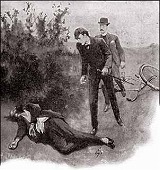
Holmes turned the body over reverently, and examined it with great attention. He then sat in deep thought for a time, and I could see by his ruffled brow that this grim discovery had not, in his opinion, advanced us much in our inquiry.
“It is a little difficult to know what to do, Watson,” said he, at last. “My own inclinations are to push this inquiry on, for we have already lost so much time that we cannot afford to waste another hour. On the other hand, we are bound to inform the police of the discovery, and to see that this poor fellow’s body is looked after.”
“I could take a note back.”
“But I need your company and assistance. Wait a bit! There is a fellow cutting peat up yonder. Bring him over here, and he will guide the police.”
I brought the peasant across, and Holmes dispatched the frightened man with a note to Dr. Huxtable.
“Now, Watson,” said he, “we have picked up two clues this morning. One is the bicycle with the Palmer tyre, and we see what that has led to. The other is the bicycle with the patched Dunlop. Before we start to investigate that, let us try to realize what we do know, so as to make the most of it, and to separate the essential from the accidental.”
“First of all, I wish to impress upon you that the boy certainly left of his own free-will. He got down from his window and he went off, either alone or with someone. That is sure.”
I assented.
“Well, now, let us turn to this unfortunate German master. The boy was fully dressed when he fled. Therefore, he foresaw what he would do. But the German went without his socks. He certainly acted on very short notice.”
“Undoubtedly.”
“Why did he go? Because, from his bedroom window, he saw the flight of the boy; because he wished to overtake him and bring him back. He seized his bicycle, pursued the lad, and in pursuing him met his death.”
“So it would seem.”
“Now I come to the critical part of my argument. The natural action of a man in pursuing a little boy would be to run after him. He would know that he could overtake him. But the German does not do so. He turns to his bicycle. I am told that he was an excellent cyclist. He would not do this, if he did not see that the boy had some swift means of escape.”
“The other bicycle.”
“Let us continue our reconstruction. He meets his death five miles from the school - not by a bullet, mark you, which even a lad might conceivably discharge, but by a savage blow dealt by a vigorous arm. The lad, then, had a companion in his flight. And the flight was a swift one, since it took five miles before an expert cyclist could overtake them. Yet we survey the ground round the scene of the tragedy. What do we find? A few cattle-tracks, nothing more. I took a wide sweep round, and there is no path within fifty yards. Another cyclist could have had nothing to do with the actual murder, nor were there any human footmarks.”
“Holmes,” I cried, “this is impossible.”
“Admirable!” he said. “A most illuminating remark. It is impossible as I state it, and therefore I must in some respect have stated it wrong. Yet you saw for yourself. Can you suggest any fallacy?”
“He could not have fractured his skull in a fall?”
“In a morass, Watson?”
“I am at my wit’s end.”
“Tut, tut, we have solved some worse problems. At least we have plenty of material, if we can only use it. Come, then, and, having exhausted the Palmer, let us see what the Dunlop with the patched cover has to offer us.”